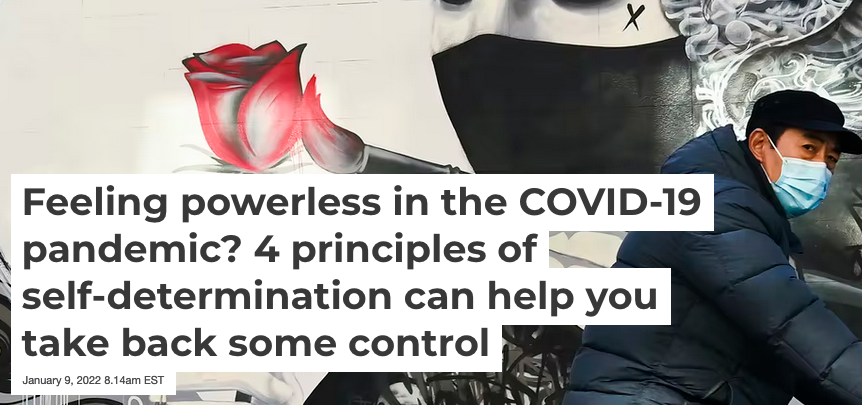Hear from faculty, staff and students
About why studying wellbeing is important for students
What’s Right With You Now?
Learn to see strength in moments of crisis
This project was born out of Frances Garrett‘s desire to support higher education students as a conflagration of stressors swept the globe: the COVID-19 pandemic, ongoing climate disaster, and sustained systemic injustice. Her teaching increasingly came to highlight issues of equity and anti-racism, foreground the teaching of specific skills for wellbeing, and stimulate environmental ethics. Her approach to creative, embodied, and contemplative experiential learning practices was increasingly informed in particular by key principles of trauma-sensitive, place-responsive and regenerative sustainability teaching methods.
With the generous support of eCampusOntario’s Virtual Learning Strategy in 2021, Dr. Garrett set out to interview faculty, students, and staff around University of Toronto to learn more about how they were working to support
student mental health and wellbeing. Those interviews form the foundation of Windvane.
Windvane is also situated both methodologically and geographically on the land here in Canada. The city of Toronto is located in the Dish With One Spoon Territory. The Dish With One Spoon is a treaty between the Anishinaabe, Mississaugas and Haudenosaunee that bound them to share the territory and protect the land. Subsequent Indigenous Nations and Peoples, Europeans and all newcomers have been invited into this treaty in the spirit of peace, friendship and respect, although the history of colonialism has left a terrible legacy that continues to affect our communities.
How can a commitment to healing-centered engagement draw out teaching and learning practices that are culturally-informed and place-responsive, that enable us to develop awareness of our interconnectedness with place and with the land, as well as with our ancestral lineages and community histories?
In an interview with the online magazine Mad in America, How Western Psychology Can Rip Indigenous Families Apart, Lisa Lacerda-Vandenborn, a professor at the University of Calgary, suggests that we learn to think about mental health as “only one aspect of emotional, spiritual, and physical health,” which are themselves “intertwined to a sense of place, to land, to the teachings of the land, to ancestral teachings, and to a sense of the history of that particular community.” She explains how biomedical psychology’s individualist approach has traumatized Indigenous and other racialized families through its role in the child welfare system, for example, as it has often neglected to see families as systems operating within larger systems of oppression. The onus then falls on individuals to cope in healthier ways, while their context of poverty and lack of social support is allowed to remain unquestioned. As Lacerda-Vandenborn says, “That’s where social justice really comes in because we need to attend to our positionality and our intersectionality every time we enter a particular office. We like to think we are all humans, and that’s one aspect of it, but there is power; the analysis of that power is missing.”
Unless we change our approach to wellbeing, the practical changes we try may lead to exhaustion.
“The anthropology of disasters has shown that disasters do not even out inequalities but, on the contrary, deepen and worsen them.”
Anthropologist Sandrine Revet asks in a 2020 interview whether the pandemic should be considered a “natural disaster” rather than a “health crisis”, and she draws on research in the anthropology of disasters to help us think about how the COVID-19 pandemic is affecting not only individuals’ health, but a whole interconnected web of social, environmental, economic, and political dimensions in addition to individual health. Reading or listening to Kwame Anthony Appiah’s article in The Guardian, A Tale of Two Pandemics: the true cost of Covid in the global south, we can see how much of the world is dealing with “devastating second-order coronavirus effects.” Appiah reminds us, however, how we now have an opportunity to think about building a more fair international order. Revet’s work traces how “survival communities” develop within households, apartment buildings, or neighborhoods, for example, to support the group and its most vulnerable members in times of disaster. Anthropologists look at how stories, art, music, photos, and everyday conversations can give meaning to “extraordinary circumstances.”
How healing-centered engagement and social prescribing fosters wellbeing
Our team’s work on this project is inspired by Dr. Shawn Ginwright‘s approach to ” healing-centered engagement.” Dr. Ginwright’s model helps us understand limitations in “trauma-informed care” – although understanding the effects of trauma in ourselves and our societies is certainly important, it can sometimes focus too much attention on traumas experienced by isolated individuals, and not enough on the effects of collective harm. It may also focus too much on treatment of pathology, and not enough on fostering wellbeing.
Dr. Ginwright writes, “A healing centered approach to addressing trauma requires a different question that moves beyond ‘what happened to you‘ to ‘what’s right with you‘ and views those exposed to trauma as agents in the creation of their own well-being rather than victims of traumatic events.”
In this article in
The Conversation, Windvane contributor
Professor Kate Mulligan explains how social prescribing helps us get involved in social groups that reconnect us with activities we love and reduce isolation. A key part of this is “self-determination” – listening to an
individual and hearing what matters most to them, and then helping them meet those goals. When we meet our goals, we feel more competent and more capable of giving back to others, which fosters interrelated wellbeing.
Feeling empowered about your own health is critical for communities as well as individuals. During the COVID-19 pandemic, it has become all the more important to think about working toward wellbeing at the community level. Dr.
Mulligan’s 2022 report, ”
Strengthening Community Connections: The Future of Public Health is at the Neighbourhood Scale,” commissioned by the Office of the Chief Public Health Officer at the Public Health Agency of Canada, describes four actions
critical for supporting communities to take better control of their own health.
Student Feedback
In 2019, Windvane creator Dr. Frances Garrett started including a “self-care” assignment in her undergraduate courses at the University of Toronto. Feedback from students on that project inspired the creation of Windvane.

